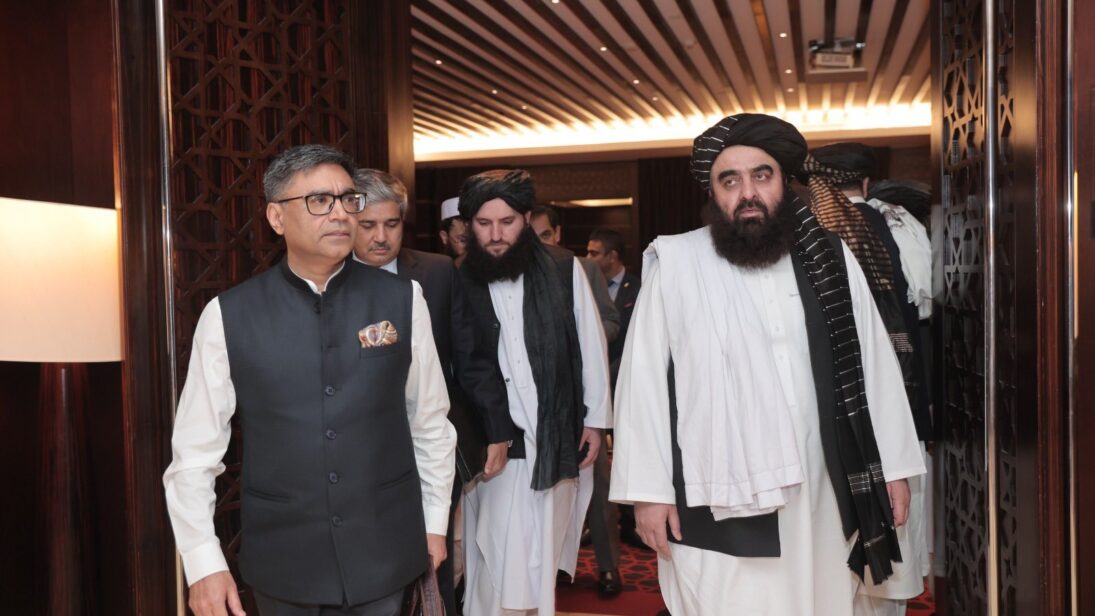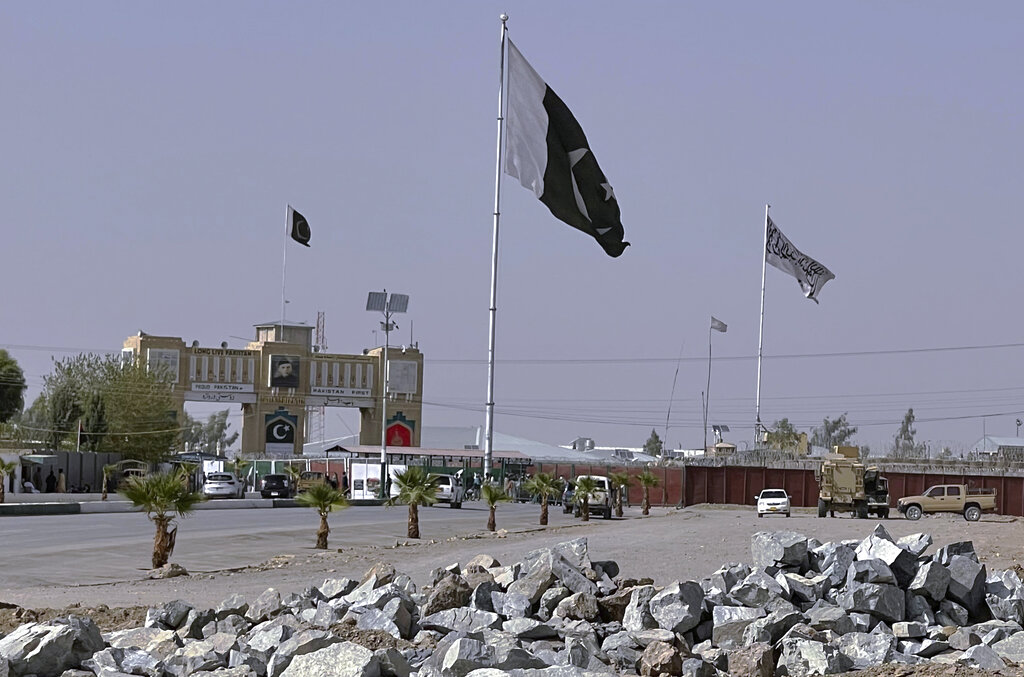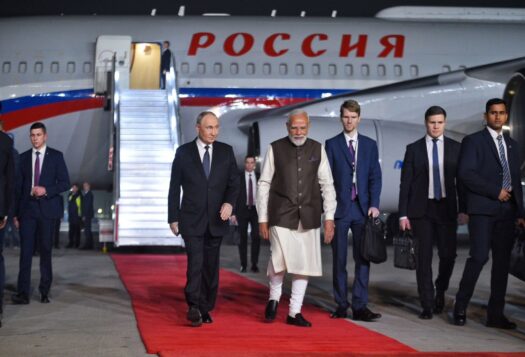
Recent Indian moves such as foreign secretary Vikram Misri’s meeting with the Taliban regime’s foreign minister in January 2025 and news reports of New Delhi potentially accepting a Taliban representative to head the embassy have generated a lot of curiosity regarding India’s objectives, current approach, and future course of action vis-à-vis Kabul. However, given India’s engagement with Afghanistan in the last two decades, these actions can be viewed as a continuation of its past initiatives, which have focused both on rebuilding Afghanistan as well as securing New Delhi’s own interests.
India’s Strategic Goals in Afghanistan
While historically it is India’s civilizational and cultural ties with Afghanistan that have dictated engagement, its strategic and security objectives have been critical drivers of its relationship with Kabul more recently. India’s keenness to expand connectivity networks with Central Asia, and its deep security concerns emanating from the past experience of Pakistan-linked anti-India groups finding support on Afghan soil have been important factors impelling its presence in Afghanistan. This may explain why India’s engagement with Taliban 2.0 stands in complete contrast to its position in the 1990s when it opted for complete cessation of its relationship with Afghanistan after the Taliban took over.
When the republican regime rapidly disintegrated and the Afghan security forces lost ground, New Delhi came around to the realization that the Taliban 2.0 is the new normal. Given India’s high stakes involvement, New Delhi considered it sagacious to potentially begin engaging with the Taliban in order to manage the challenges emanating from Afghanistan.
India’s engagement with Afghanistan in the current context can be understood in two phases. The first phase of the relationship started post 2001, after the United States-led war on terror dismantled Al-Qaida and removed the Taliban from power, eventually facilitating the elected regime in Afghanistan. Post 2001, the India-Afghanistan relationship evolved from one restricted to governmental exchange to a more expansive bilateral driven by strong people-to-people contact. The focus of India’s engagement became developmental projects, including related to hydropower, health, education, and humanitarian aid. India’s assistance to Afghanistan during this period amounted to close to USD 3 billion, and the development support included over 500 projects that have significantly impacted Afghan lives. India consciously abstained from military engagement in Afghanistan, remaining focused on infrastructure, skill development and capacity-building programs, which transcended into enormous goodwill and soft power for New Delhi. While India was unsure of the future political dynamics in Afghanistan with the Taliban’s uncompromising position at the Doha talks, it maintained its principled position of supporting democracy in the country and consistently siding with the elected regime.
The second phase of India’s positioning vis a vis Afghanistan started post-August 2021 after the hasty withdrawal of U.S. troops and the unexpectedly expedited defeat of Afghan forces. Initially, expecting an aggressive posture from the pro-Pakistan Taliban, India opted to shut down its consulates in Afghanistan and focused on the safe return of its nationals. But while it was apprehensive of the Taliban’s position, New Delhi was also keen to guard its security and strategic interests in the region, having learnt its lessons from the past. India’s position with the Taliban in the 1990s had diminished its ability to monitor the activities of anti-India groups on Afghan soil. Whereas twenty years of deep engagement with Kabul allowed India to expand its presence in the country, diversify connectivity options in the region, and better protect its security. New Delhi also recognized that the Taliban 2.0 are much more organized and independent than their 1990s brethren and have more legitimacy and little opposition in Afghanistan. So, when the republican regime rapidly disintegrated and the Afghan security forces lost ground, New Delhi came around to the realization that the Taliban 2.0 is the new normal. Given India’s high stakes involvement, New Delhi considered it sagacious to potentially begin engaging with the Taliban in order to manage the challenges emanating from Afghanistan.
The Road to Kabul
India began its efforts multilaterally, underscoring its commitment towards a regional approach to deal with the challenges emanating from the situation in Afghanistan. In November 2021, New Delhi hosted a regional security conference to deliberate on how to promote peace and stability in Afghanistan, however both China and Pakistan declined to attend. India’s National Security Advisor (NSA) Ajit Doval hosted an inaugural special meeting with his regional counterparts from Central Asia in December 2022 and then again in October 2023, and Afghanistan was a critical focus of both talks. India also hosted the first India-Central Asia Joint Working Group on Afghanistan in March 2023, providing an opportunity for regional states to discuss the security situation and future dynamics in their neighboring country. India also partnered with the United Nations World Food Programme for the delivery of 20,000 MTs of wheat for the Afghan people through the Chabahar Port in Iran, when Pakistan was reluctant to facilitate India’s humanitarian assistance to Kabul.
Parallelly, on the bilateral side, after a cautious pause of around nine months, India decided to re-open its embassy in Kabul in June 2022 and take the first step towards supplying aid to Afghanistan. Four factors were critical in driving this decision. First, India was deeply concerned about the humanitarian crisis in the country and remained committed towards safeguarding the Afghan people. Second, India did not wish to let its past developmental efforts go in vain. Third, the Taliban’s openness towards India started becoming obvious, as the group refrained from making any anti-India statements. Fourth, there was a realization in New Delhi that the Taliban are here to stay and that the way to approach Afghanistan would have to be through the Taliban.
Thus, a technical mission was assigned to the embassy in Kabul to oversee the distribution of humanitarian assistance, including wheat, medical aid, and earthquake relief assistance. Since then, India’s support has gradually expanded, with New Delhi partnering with the United Nations Office on Drugs and Crime in order to extend assistance the Afghan drug user population and continue scholarships for Afghan students through the Indian Council for Cultural Relations scholarship scheme. Interestingly, the scheme extends to the students living in Afghanistan, with priority given to female students.

There is speculation that India’s Afghanistan policy is thriving because of Pakistan’s deteriorating relations with the Taliban. The Taliban have historically enjoyed the patronage of the Pakistan military, and this largely shaped India’s calculus vis a vis the Taliban, until recently. Pakistan saw the defeat of the republican regime in Afghanistan and the Taliban takeover as its strategic victory in Kabul. However, the Taliban’s uncompromising position on the Durand Line, flagrant opposition to the fencing of the Afghanistan-Pakistan border, and overt unwillingness to restrain the Tehreek-e-Taliban Pakistan’s (TTP) actions against Pakistan have not complied with Pakistan’s wishful expectations, leading to increasing strains in the bilateral relationship. As the Taliban seek new alliances in the wake of growing hostility vis-à-vis Pakistan, they seem to see India as a reliable and consistent partner with a robust economy. While the Taliban’s growing tension with Islamabad is not the driver for India’s engagement with the Taliban, this current reality has undoubtedly contributed towards building trust and a more positive India-Afghanistan relationship.
Future Direction and Questions to Consider
It appears that New Delhi will take small steps and there will be a slow expansion in India’s role in Afghanistan over the next few years, with revival of some of the crucial developmental projects first. But New Delhi’s Afghan policy seems to be evolving along with the developments within Afghanistan as well as regional responses to the situation, so only a limited assessment can be done about its long term strategy as of now. However, without the formal recognition of the Taliban, there are likely to be limitations on the expanse of India’s engagement.
India has so far opted for a middle path in Afghanistan, by having a presence in Kabul and engaging with the Taliban to secure its interests without formal recognition. While India’s position on the recognition of Afghanistan is aligned with the international community, its current engagement aims to balance its focus on the well-being of Afghans, cautiously guard its security concerns, cater to its strategic objectives, and drive regional stability. However, New Delhi’s future approach towards the Taliban will depend on whether the group can offer commitments to address Indian concerns.
India’s evolving approach towards Afghanistan is in sync with its Neighbourhood First policy, which prioritizes stability in the region while addressing its strategic and security concerns. Flowing from that, India would need the Taliban to ensure that Afghan soil is not being used by anti-India terror factions. The lessons from the hijacking of Indian Airlines Flight IC-814 in 1999 cannot be overlooked by Indian policymakers. Additionally, the security challenges emanating from Afghanistan and the volatile Afghanistan-Pakistan border could pose severe risks to regional security. According to the United Nations Security Council Report (2024), “terrorism emanating from Afghanistan will be a driver of insecurity in the region and further afield in most scenarios,” and “greater collaboration among Al-Qaida affiliates and TTP could transform the latter into an ‘extra-regional threat.’” This along with the Islamic State-Khorasan Province (ISKP)’s growing threat is alarming for New Delhi. While recent initiatives by India indicate that it is likely to adopt a regional approach to highlight the proliferation of TTP activities and the ISKP challenge and seek regional cooperation for counterterrorism, it is likely to push the Taliban for security guarantees.
India has so far opted for a middle path in Afghanistan, by having a presence in Kabul and engaging with the Taliban to secure its interests without formal recognition. […] However, New Delhi’s future approach towards the Taliban will depend on whether the group can offer commitments to address Indian concerns.
Today, the Taliban has monopolized power in Afghanistan and has managed to maintain a posture of unity, which they perceive as their biggest strength. Although they are trying hard to emulate the traits of evolved governance, offer indications of economic recovery, and provide security assurances to Afghans and regional stakeholders, the Taliban has shown no leniency on the issues of inclusive government and girls’ education. This intransigence will have to be assessed and evaluated as India considers its future engagement with the Taliban.
India’s Afghan policy is not free of challenges given the historical and ideological background of the Taliban, the group’s growing ambitions for recognition, and alarming security challenges posed by non-state actors. But New Delhi’s emerging diplomatic position has been shaped by its economic goals and the need for political stability in the region as well as to ensure its security interests, compelling it to take bold strategic choices. Indian foreign policy in the region has broadly opted to prioritize national interests while balancing the potential risks involved, and Afghanistan seems no exception.
Also read: Shifting Alliances: The Taliban’s Evolving ties with India and Pakistan
***
Image 1: Randhir Jaiswal via X
Image 2: via Free Malaysia Today
Views expressed are the author’s own and do not necessarily reflect the positions of South Asian Voices, the Stimson Center, or our supporters.


